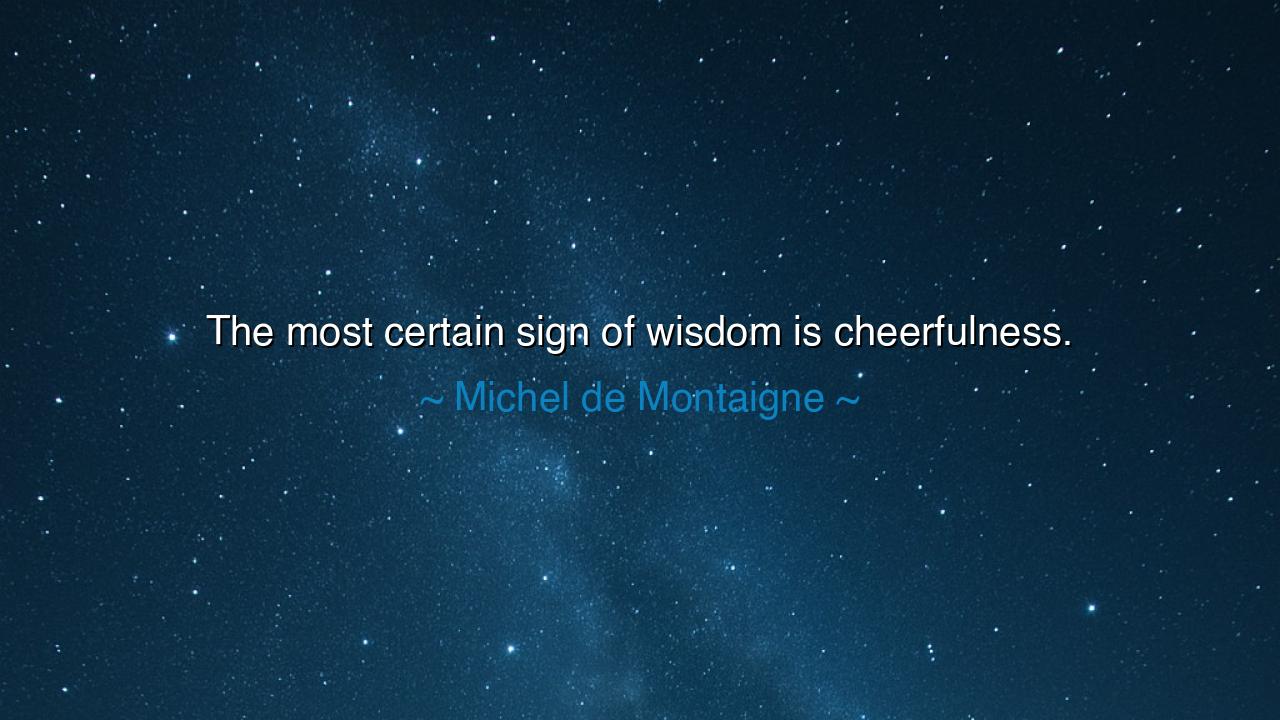
The most certain sign of wisdom is cheerfulness.






“The most certain sign of wisdom is cheerfulness.” These profound words from Michel de Montaigne call us to understand that wisdom is not simply found in the serious, somber musings of the mind, but in the way a person approaches life with a light heart and a cheerful spirit. True wisdom, as Montaigne suggests, is not a weight that burdens the soul but a radiance that illuminates it. The wise do not walk in sorrow or despair but embrace the journey with joy, knowing that cheerfulness is not a denial of the hardships of life, but a deeper understanding of them — a knowing that allows one to navigate through difficulty with grace.
In the ancient world, the Stoics, particularly Marcus Aurelius and Epictetus, understood that life was filled with hardship, yet they also understood that wisdom lay in how one responded to these difficulties. Marcus Aurelius, despite being the emperor of a vast empire, wrote with remarkable serenity in his journals, reflecting on how the trials of life could be met with calm and equanimity. He did not succumb to bitterness or despair but maintained a spirit of cheerfulness in the face of adversity, recognizing that true wisdom comes not from avoiding suffering, but from confronting it with a steady heart. In this way, he embodied the very cheerfulness Montaigne speaks of — a cheerfulness born from a profound inner strength and understanding.
Consider the story of Confucius, the revered Chinese philosopher, who, despite living through periods of turmoil and personal loss, was known for his cheerful demeanor and optimistic outlook on life. Even when he faced political exile and failure, he continued to teach with a heart full of hope, guiding his disciples not just with words of wisdom, but with a joyful spirit. His belief that one should live in harmony with the world, regardless of the challenges, resonates with Montaigne’s idea that true wisdom manifests in the ability to find joy even amidst hardship. Confucius understood that cheerfulness was not just a personal virtue, but a way of transforming the world around him, teaching that a positive and calm heart can uplift others and create peace.
In modern times, Nelson Mandela embodies the same understanding of cheerfulness as a sign of wisdom. After spending 27 years in prison, he emerged not with bitterness or anger, but with a spirit of reconciliation and joy, determined to bring peace to his fractured country. His cheerfulness in the face of personal suffering was not a naive denial of reality, but a profound act of wisdom. Mandela recognized that to achieve his goal of a united South Africa, he needed to lead not with anger, but with a heart full of hope, demonstrating the transformative power of cheerfulness even in the most dire circumstances.
Thus, Montaigne’s words remind us that wisdom is not only about knowledge, intellect, or understanding, but about how one chooses to live in the world. Cheerfulness is the natural outgrowth of wisdom because it reflects an acceptance of life’s impermanence, a joyful embrace of its fleeting beauty. Wisdom allows us to transcend sorrow and hardship, recognizing that life is a journey to be enjoyed, not merely endured. Cheerfulness is the heart’s response to the understanding that even in suffering, there is always the possibility of joy.
In conclusion, let us remember that the most certain sign of wisdom is not how deeply we can ponder the complexities of life, but how gracefully we can meet it with a cheerful spirit. True wisdom illuminates the soul, allowing us to face life’s trials with grace, humor, and joy. Montaigne calls us to seek this cheerfulness, for in it we find not only the depth of wisdom but the true art of living.






GLNguyen Gia Linh
It’s compelling to link wisdom with cheerfulness because it implies that understanding life deeply brings serenity and joy. But it makes me question whether people who are constantly serious or brooding lack wisdom, or if they simply express it differently. Could it be that cheerfulness is just one manifestation of a deeper understanding of life, rather than a strict criterion? How do we balance observing joy with recognizing the complexity of human emotion?
DVTran Dai Vy
This quote raises an interesting point about perception versus reality. Can we really judge someone’s wisdom based on their cheerfulness, or is it more about the composure and lightness with which they navigate challenges? I also wonder if cultural factors influence this perception—some societies value seriousness or stoicism over cheerfulness. How universal is this association between wisdom and happiness, and what might it say about the human approach to understanding life?
XNDoan Xem Nao(MK)
I find it fascinating that cheerfulness is considered a sign of wisdom. Could it be because a wise person has accepted life’s uncertainties and learned to find peace within them? But then, how do we interpret situations where wise people struggle emotionally—does that make their wisdom any less real? It makes me think about how external demeanor relates to internal insight, and whether true wisdom is always visible in one’s attitude.
TTomlom
This makes me wonder about the connection between inner wisdom and outward happiness. Does true wisdom naturally lead to cheerfulness, or can someone be wise yet solemn or melancholic? It also raises the question of whether people mistake superficial cheerfulness for wisdom. How do we differentiate between genuine contentment that stems from understanding life and a forced or performative optimism that masks ignorance or insecurity?